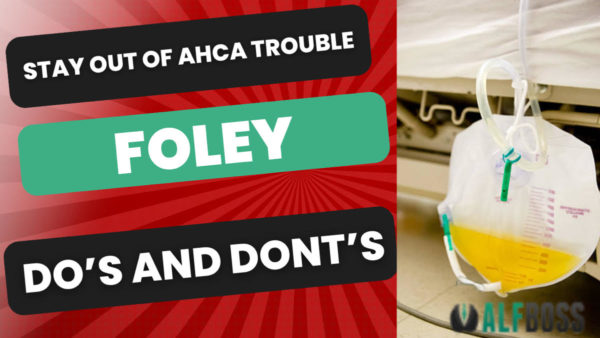
How to Stay Out of Trouble with AHCA: Foley Catheter Management in Assisted Living Facilities
Understanding Foley Catheter Regulations in Florida’s Assisted Living Facilities
Foley catheters, a common medical device used to manage urinary incontinence, present unique challenges in Florida’s assisted living facilities. Understanding the regulations surrounding their use and the roles of facility staff and nursing services is crucial for ensuring compliance with the Agency for Health Care Administration (AHCA) and providing the best care for residents. Here’s a comprehensive guide on what is allowed under current Florida regulations and how to avoid getting into trouble with AHCA.
Foley Catheter Management in Florida Assisted Living Facilities
1. Basic Foley Catheter Management:
In Florida, facilities with standard or limited mental health licenses are permitted to have staff perform basic Foley catheter management tasks. Specifically:
Emptying the Bag: Facility staff in Florida may empty the catheter bag as part of their routine duties. This task is straightforward and involves minimal risk when proper hygiene practices are followed.
2. Nursing Duties Related to Catheter Care:
For tasks requiring medical expertise, such as changing the catheter bag and other medical actions, the responsibilities differ based on the facility’s licensing in Florida:
Standard and Limited Mental Health Facilities: These Florida facilities must outsource all nursing-type services related to Foley catheter care to a third-party home health provider. This includes:
– Changing the catheter bag.
– Taking urine samples.
– Managing catheter-related complications.
– Performing catheter insertions and removals.
– Monitoring and treating catheter-associated infections.
Extended Congregate Care (ECC) and Limited Nursing Services (LNS) Licenses:** Facilities holding an ECC or LNS license in Florida can have their staffed nurse perform the necessary nursing duties related to catheter care. This includes all the tasks that would otherwise require outsourcing in a standard licensed facility.
3. Outsourcing to Home Health Providers:
Even in facilities with an ECC or LNS license, it is often advisable to outsource catheter-related nursing duties to a third-party home health provider. This recommendation is primarily to limit liability exposure. Outsourcing ensures that specialized and potentially risky medical procedures are handled by professionals specifically trained in these tasks, thereby reducing the risk of complications and associated legal liabilities.
4. Supervision for Dementia Residents:
It is also critical that Florida facilities provide proper supervision for residents with dementia who have a Foley catheter. These residents might attempt to pull out the catheter, leading to injury and complications. Ensuring vigilant supervision can help prevent such incidents and ensure the safety and well-being of these vulnerable residents.
Potential Pitfalls and How Florida Facilities Can Get into Trouble with AHCA
Managing Foley catheters in Florida’s assisted living facilities involves strict adherence to AHCA regulations. Here are some common ways Florida facilities can run afoul of these regulations and how to avoid them:
1. Inadequate Training for Staff:
Failure to properly train staff on Foley catheter management can lead to mishandling, increasing the risk of infections and injuries. Ensure all staff are thoroughly trained and regularly updated on best practices and protocols.
2. Improper Documentation:
Accurate documentation is crucial. Florida facilities must maintain comprehensive records of all catheter-related care, including bag emptying, changes, and any incidents. Poor documentation can result in citations during AHCA inspections.
3. Inadequate Infection Control Measures:
Not adhering to strict hygiene protocols can lead to infections, which are a serious concern with Foley catheters. Ensure all staff follow rigorous hand-washing procedures, use gloves, and sterilize equipment properly.
4. Failing to Outsource Nursing Duties When Required:
Standard and limited mental health facilities in Florida must outsource nursing tasks related to Foley catheters to licensed home health providers. Failing to do so can result in severe penalties. Always verify that outsourcing requirements are met.
5. Insufficient Supervision of Dementia Patients:
Dementia patients may attempt to remove their catheters, causing injury. Florida facilities must provide adequate supervision to prevent such incidents. This includes regular checks and interventions as necessary to ensure safety.
6. Neglecting Regular Audits and Reviews:
Conducting regular audits and reviews of Foley catheter management practices is essential. This helps identify and rectify any compliance issues promptly. Failure to perform these reviews can lead to overlooked problems that result in AHCA citations.
Best Practices for Foley Catheter Management
1. Hygiene and Infection Control:
Maintaining high standards of hygiene and infection control is paramount. This includes regular hand washing, using gloves, and adhering to sterilization procedures when handling catheters.
2. Training and Education:
Staff should receive comprehensive training on the basics of Foley catheter management, including the safe and hygienic emptying of the catheter bag. Continuous education on updated practices and regulations is also essential.
3. Communication and Documentation:
Clear communication between facility staff, nurses, and third-party providers is crucial. Documenting every step of catheter care can help track the patient’s health status and ensure compliance with regulations. This includes recording when the bag is emptied, any issues encountered, and any nursing interventions performed.
4. Regular Audits and Reviews:
Conduct regular audits and reviews of Foley catheter management practices to ensure compliance with regulations and identify areas for improvement. This can help maintain high standards of care and prevent potential issues.
Conclusion
Proper management of Foley catheters in Florida’s assisted living facilities is vital for the health and comfort of residents. By understanding the regulations and implementing best practices, facilities can ensure compliance and provide high-quality care. Whether through in-house nurses or third-party home health providers, the goal should always be to minimize risks and enhance the well-being of residents.
For facility owners and operators in Florida, staying informed and proactive in managing Foley catheter care can significantly contribute to the overall quality of service and resident satisfaction. Remember, when in doubt, outsourcing to a professional home health provider is a prudent choice to safeguard both the residents and the facility. Proper supervision, especially for dementia residents with Foley catheters, is crucial to prevent injuries and ensure their safety.
